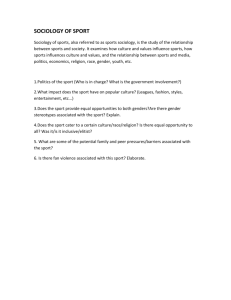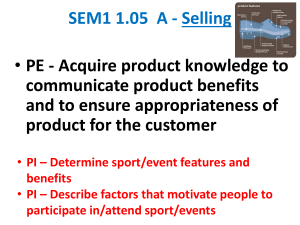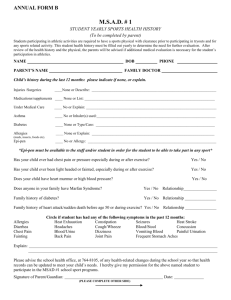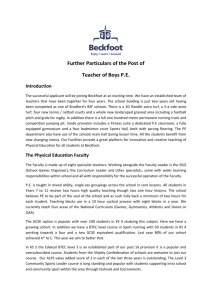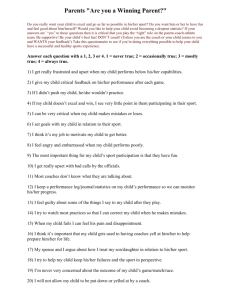20 under 20 in the Sports Business Industry by the prestigious
advertisement
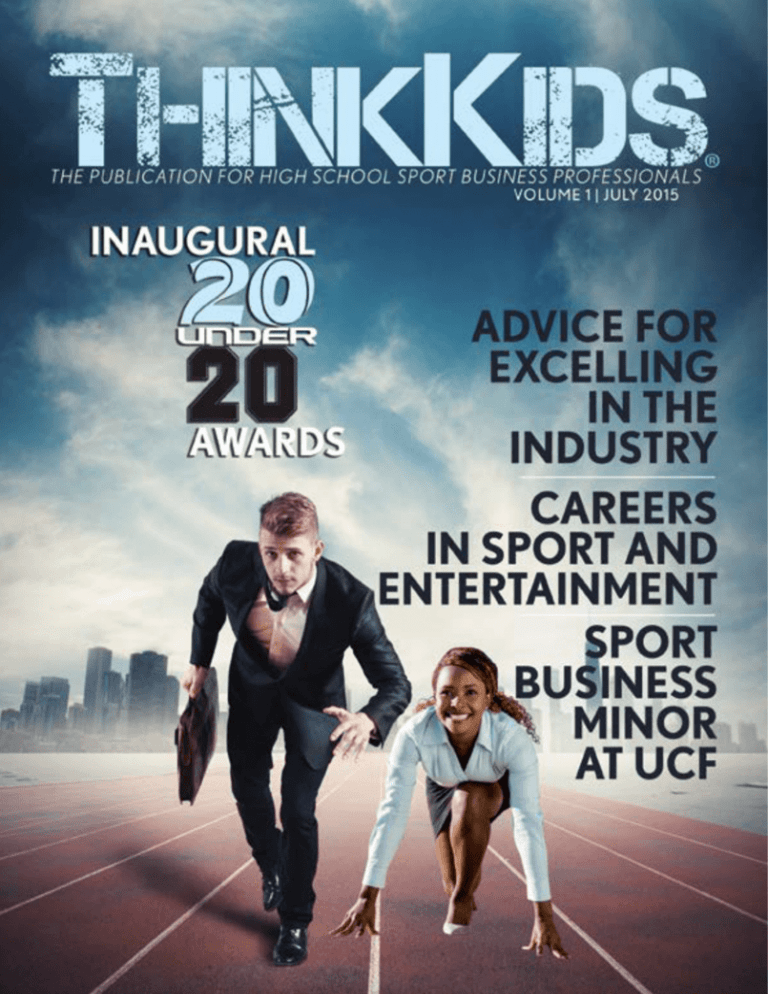
Welcome to the first issue of ThinkKids. We are excited to create the first publication specifically geared toward high school students who are interested in working in the sport business and entertainment management industry. This first issue contains several featured articles on the business of sport and strategies for career success, as well as input and insight from current college students and sport business industry leaders. We also announce the inaugural "20 Under 20 Awards" in this issue of ThinkKids. We recognize twenty individuals under the age of 20 who are making plays in the sport business industry. This issue of ThinkKids spotlights three of the 20 award recipients. We hope you nominate one or more deserving individuals for this award in 2016. We plan to publish ThinkKids each year in July. Scott Bukstein & C. Keith Harrison Sport Business Management Professors, College of Business ADMINISTRATION at UCF FINDING YOUR NICHE IN THE SPORT BUSINESS INDUSTRY IN REALITY, WE OWE IT TO OURSELVES TO WAKE UP EXCITED FOR THE JOB WE LOVE EVERY DAY. ” From my daily appointments with ESPN for Pardon the Interruption and my hour-long sports debates with friends in the school cafeteria, my nine-year-old self quickly realized that sports were my passion and that a job in sports would be the closest thing to never having to work a day in my life. Fortunately, there are tons of jobs and avenues to pursue in sports – one of the fastest growing industries in the world. And while competition will always be cutthroat for jobs in a field as appealing as sports, there are plenty of reasons to remain optimistic about landing the job you are passionate about. There’s a criminal misconception in our society that tells us the only way to enter the sports industry is through connections. When I started writing, I was discouraged because everything I had heard about the sports industry told me that my dream job was out of reach without someone handing me that first break. Then I read Malcolm Gladwell’s Outliers and started thinking about my path into the sports industry differently. While Gladwell argues success, in many ways, can be predetermined by external factors such as connections, there are plenty of other ways to manipulate the path into achieving your dreams by simply staying alert and maximizing on opportunities. In other words... find your passion, tailor that passion toward your skill sets and constantly plan a few steps ahead toward the future. All it takes is a little strategy to set yourself up for a legitimate pursuit of your dreams. I chose to attend Emory University in large part because I knew I wanted to start my career in a major city that had professional sports teams. By my sophomore year, I was interviewing childhood heroes with media access at Atlanta Hawks games by offering the team free publicity through the school’s newspaper coverage. I eventually discovered my true passion within the new surge of basketball analytics. Basketball analytics force me to watch the sport in a much more determined manner and helps me confirm or dispel observations through objective statistics. Those observations have led to the most rewarding and interesting stories I have investigated. Equally as important, basketball analytics is a specialized field – meaning the job market has yet to fully develop. Pursuing a career within the relatively anonymous niche of basketball analytics feels significantly more attainable than pursuing a career in the relentless cacophony of sports talk shows. That’s not to say basketball analytics is for everyone nor is it to say finding a niche means you will have to insulate yourself to that one thing for the rest of your life. Simply start with one passion and continue to strategize with that passion until an idea for a career emerges. Treat everyone you meet with respect and sincerity along the way and before you know it, you will be on the verge of a big breakthrough. Because in reality, we owe it to ourselves to be able to wake up excited for the job we love every day. Jacob Eisenberg Emory University Goizueta Business School COMPETITIVE EDGE you have it and don’t even realize it THE Do you spend any of your free time networking or planning for your future? If you are like the majority of high school students I’m sure the answer is, “No”. So wouldn’t it be nice to be a part of the minority and actually start to take steps for your career and future? If you start now, you will already be above your fellow peers, set yourself up for success, and employers will be knocking at your door instead of you being just another resume on their pile of applicants. I’m Alysse Metzler, Author of, “The Recruiting Snitch, Recruiting Secrets to Help Land Your Dream Job. I’ve been a Corporate Recruiter for 10 years and the last 3 years have been with EA SPORTS, Zynga, and FanDuel. I’m 30 years old and have been recruiting for 10 years. So I started when I was 20 years old, however, I actually started when I was 13. That’s right. I started as a babysitter where I worked for some wealthy families whose parents were all very successful at their jobs. One family hired me to work for their mortgage company when I was just a junior in college and the rest is history. So as you see, I started young and now at 30 years old, I have 10 years of experience, a published book, I own my own resume writing company, and I travel across the country conducting career empowerment seminars. In order to get an edge above the competition you must start now. >> Alysse Metzler Corporate Recruiter and Author of “The Recruiting Snitch, Recruiting Secrets to Help Land Your Dream Job” 3 things you should be doing now to get an edge above the competition. 1 have a plan I know right now you may not have a clue on what exactly you want to do with your life, and that is okay. Start to think about what you are passionate about and what natural skills you have. Then, do some research online to see what careers are out there and sound interesting to you. You can do this by going to indeed. com and looking up job titles that interest you. Take a look at the requirements for the job. You now know what you need to do in the next 4-6 years to be qualified for that job. 2 3 NETWORK I’m sure you’ve heard, “It’s not about what you know, it’s about who you know.” Well, I have a different philosophy which is, “It’s not about who you know, it’s about who knows you.” The goal is to be so good at what you do and be so connected in the industry that people are calling you for opportunities. This takes years to build up so start now. Talk to friends of your parents, learn about their jobs and how they got there, and ask to shadow people at work during the summers. Use your time and the fact that you are still in high school to your advantage, people will want to help you so ask and get to know people who are already working. When you attend sporting events, talk to the people who work at the event, exchange information and follow up with them to learn more. Start now. USE SOCIAL MEDIA I’m sure you use social media to connect with your friends. Social media is also a great way to connect with professionals and professional groups. When you read an interesting article or watch a video, take a look at who wrote it or posted the video, the writer always has ways to connect with them at the end of their article. So connect with them, reach out and see if they would be willing to talk to you about how they got in to their career. Remember, as a high school student, most people will be willing to talk to you to help mentor you. So use this time to your advantage. By starting now with the 3 items above, you will be building your network, knowledge, and be leaps and bounds ahead of your fellow classmates. This is just the beginning, so to learn more about making yourself marketable for your career, resume writing, interviewing for success, and so much more, pick up your copy of The Recruiting Snitch today at www.recruitingsnitch.com. 1. In your opinion, how should students reach out to potential employers in terms of finding a job in sports? I recommend that students reach out to potential employers when students can help instead of when students want help. For example, students can assist potential future employers by volunteering at local sport business events. Students can also participate in sport business discussions on Twitter (for example, weekly #sbchat discussions) as well as in sport business groups on LinkedIn. It is imperative for students to develop their personal and professional brand so that a sport business organization has incentive to invest. Students can develop a basic yet informative website, create business cards and order customized stationary. I recommend that students mail hand-written letters to sport business professionals asking to meet for coffee or lunch to learn more about strategies for breaking into the industry. In addition, I encourage students to focus broadly with respect to career goals. There are many career opportunities in the industry beyond working for professional sport teams. > > 2. Besides experience, how can students separate themselves from the competition when looking for jobs after college? The key is to develop essential substantive skill sets as well as determine how you can add value to a sport business organization. Relationships are vital. In the sport business industry, job prospects often depend on who knows you and who knows what you know. Attend sport business-related conferences. Read the SportsBusiness Journal and peer-reviewed journal articles on the business of sport. Embrace that there are many more jobs in revenue-generating positions as compared with revenue-spending positions. And understand that there is no substitute for hard work and integrity. EMPIRICAL DATA SPOTLIGHT Students’ Career Expectations Don’t Match Reality Scott Bukstein DIRECTOR OF SPORT BUSINESS MINOR AT UCF talks about students working in the sports BUSINESS industry A recent study by Mathner and Martin of Troy University analyzed the perceptions of career expectations of students studying sport business management at the graduate and undergraduate level. The study compared student perceptions to that of practitioners in the industry. Results indicated a significant gap exists between students’ and practitioners’ perception of salary expectations, time until first sport management job, and time before advancement opportunities. The study also examined the core competencies for success in sport management from the perspective of students and that of practitioners. Students placed more emphasis on marketing skills than did practitioners. Practitioners indicated the most important skills as leadership, management skills, personality, and human relations skills. The group also suggests the most important ways to prepare for a career in sport management are volunteering, listening to mentor’s advice, joining professional organizations, and reading professional journals. These misperceptions, along with the long hours and low pay of entry level positions is likely the cause of many students deciding not to enter the sport business management industry after their first internship. To close this gap, the authors recommend sport management faculty and advisors give students realistic expectations about the industry. Mathner, Robert P. and Martin, Christina L.L. (2012) Sport Management Graduate and Undergraduate Students’ Perceptions of Career Expectations in Sport Management. Sport Management Education Journal, 6, pp 21-31. 20 20 / UNDER Garrett Colvin, Ravi Shah, and Sydney Robinson are three of the recipients of this year’s inaugural 20 Under 20 Awards. We look forward to receiving nominations for the 2016 20 Under 20 Awards, which will be announced in July 2016. GARRETT COLVIN Age: 17 College: Hoping to attend Duke or an Ivy League institution High School: South Forsyth High School Hometown: Atlanta, GA Experience: Founder of Fantasy Sports 4 Life Foundation, Inc., the first fantasy sports platform dedicated to one charitable cause. Cofounder of FSIA, LLC, a fantasy sports insurance company using an algorithm that predicts and analyzes the rate of injuries of professional athletes. Attended the Wharton Sports Business Academy at the University of Pennsylvania. Career Aspirations: A combination of sports and social entrepreneurship People in the Industry I’d Most Like to Meet: Mark Cuban, Billy Beane, Stephen A. Smith, and Matthew Berry RAVI SHAH Age: 19 College: Rutgers University Hometown: Denville, NJ Experience: Founder of Nets Daily News. Director of Social Media at The Sports Quotient. Intern at Got Invention. Brooklyn Nets Featured Columnist at New York Sports Hub. Philadelphia Eagles blogger at Fansided.com. Career Aspirations: Aspiring entrepreneur developing creative solutions in technology and sports Person in the Industry I’d Most Like to Meet: George Bodenheimer SYDNEY ROBINSON Age: 18 College: University of Massachusetts – Amherst Hometown: Houston, TX Experience: Researching NBA injury database to better predict player injuries. Launching fantasy sports insurance company and sports specific insurance company. Working with Baseball Info Solutions. Career Aspirations: Basketball operations and analytics for an NBA team STUDENT SPOTLIGHT ALYSHA BURGESS Alysha is a graduating senior of the Sport Business Management Minor at UCF. During her time in the program she participated in multiple internships and was the Sport Business Club President. She has just accepted a position with IMG Academy as a Sponsorship Activation Coordinator. Alysha gives the following advice to students interested in the sport business industry: • Volunteer with any and every organization to gain more experience and insight as to what you potentially want to do • Make connections - sometimes it is about who knows you rather than what you know • Have a positive attitude because people want to work with optimistic personalities • No job is below you: sometimes you will have to get your hands dirty but hard work does not go unrecognized • Ask questions. The only wrong decision is not making one because you didn't know what you were doing • Take chances: Don't be afraid to get out of your comfort zone and try something you thought you would have never done in a million years • Be thankful: people will help you if you help them but also if they know their efforts are greatly appreciated Chris Walsh Chris is a student in the Sports Business Management Minor, going into his senior year at UCF. Chris says, “The minor program is much more than just going to class and getting good grades, but also creating opportunities, relationships, and contacts to build your career as well as yourself as a person.” The following are a few points of advice Chris gives to students interested in the sport business industry: • • • • • • • • Take time to create relationships Volunteer, volunteer, volunteer Create opportunities for yourself, do not wait for them to come to you It's important to work just as hard outside the classroom as inside Represent your personal brand and UCF well at all times Support others within the minor in their projects and help them develop In the minor, EVERYONE is a leader, it is a matter of what you use that leadership to do Just like anything, you get out of it what you put into it and what you could get out of it is tremendous opportunities and experience. • Be compelling. Never forget these two words. STUDENT SPOTLIGHT ALUMNI SPOTLIGHT JONATHAN IHRIG Jonathan graduated from the Sport Business Management Minor at UCF in 2012, with a Bachelor’s Degree in Business. He is currently working at Learfield Sports as an account executive for Saluki Sports Properties. When asked for advice on how to break into the sport business industry, Jonathan says to focus on networking and research. • Network – The sports industry is massive, but as massive as it is there are even more people looking to break through. Take advantage of every opportunity you have to meet someone in the industry. Volunteer, reach out, and build relationships with anyone you can in the sports business world. Stay connected and have quality conversations with these people. You never know when an opportunity will become available, and they might think of you. • Research – The business of sports is ever-evolving. On the marketing side, teams and athletic departments are continually researching new ways to connect with their fans, and build value for their corporate partners. On the individual & group sales front, everybody is looking for new creative promotions to put more butts in the seats. Know that you’re never going to have “learned everything” in your department. Stay humble, stay current, and continue to find new and creative ways to make your partners & entities stand out. Add VALUE wherever you go. MANNY ORTIZ Manny graduated from the Sport Business Management Minor at UCF in 2011, and went on to earn two Master’s Degrees from UCF, in Sport Business Management and Business Administration. He currently works for the New York Mets as an Event Sales Coordinator. Manny gave the following advice to students looking to break into the sport business industry. • You need to want it and be able to do anything for it! If this is truly your passion, you need to have the fight and the hunger to do anything it takes to get your foot in the door. No job is too small. Experience is key. • Be personable and build a lasting relationship with everybody! No matter who you are, what you do or what department you work for, make a valiant effort to meet anyone and everyone for the company or organization that you work for and build a genuine lasting relationship with them because you never know when your paths will cross again or when they may recommend you for your next position. Sports is not always about who you know but more importantly who knows you. • Be passionate! Make yourself an asset to the team that you are on and make sure that you differentiate yourself from everyone else. If you can find a way to generate revenue for your team or organization, that immediately adds value to you as an employee and provides you with added job security. ALUMNI SPOTLIGHT SPORT BUSINESS PROGRAM SPOTLIGHT Opposite page, left: runners at Storm the Campus starting line Opposite page, right: additional Storm the Campus participants This page, below: Professors and students from UCF Sport Business Minor at London Olympic Park Storm the Campus 10-Miler Storm the Campus 10 Miler is a ten mile run, the longest ever completely on the UCF campus, of which the proceeds go to the Sports Business Club at UCF and Healing the Children. The first year of the race was in March 2014, which brought in 253 paid runners, including runners from nine different states and one runner from Germany, which made $2,100 for our two beneficiaries. The 2015 race grew into its own identity on the UCF campus. Storm the Campus 10 Miler hosted 313 registered runners, with an additional 86 registered virtual runners. The “Run for the ‘U’, presented by Storm the Campus 10 Miler” offered runners the opportunity to earn 2014’s ‘U’ medal, with runners completing their ‘U’ medal race in their own hometowns. The 2016 race will build off this, offering a virtual run for both the ‘U’ and the ‘C’ medals so runners who did not run previously will be able to earn all three medals of UCF. The 2016 race raised over $5,900 for the Sports Business Club at UCF and Healing the Children. The idea was initiated, developed, and executed by Sport Business Management Minor students and will continue in the coming years, with the next race in March 2016. The first year of this race was very successful, not only in bringing in funds to our beneficiaries, but the PRACTICAL Learning Visit to Paris and London runners incredible feedback of the race, the industry experience the student directors created for themselves, and the experience the fifty UCF student volunteer staff had by assisting putting on this type of event. How do you create an event from scratch, pay for a race thatcosts $10,000 to put together, and create an event that brings in runners from across the globe? The Sport Business Program teaches their students not only to volunteer and gain experience in the sport industry but to take leadership roles in developing projects and creating opportunities for themselves and others in the community. This past May, nine undergraduate students, two alumni, and two faculty advisors of the Sport Business Management Minor at UCF, traveled first to Paris then London on an experiential learning trip. The Minor takes a trip every year, giving involved and motivated students a chance to see the industry, but this was the first international voyage. In Paris, students visited the major stadiums, Stade de France, Roland Garros, Stade Jean-Bouin, and Le Parc des Princes. They also heard from executives at the Ligue de Football Professionnel, the governing body of professional soccer in France. Lastly, students visited the National Institute of Sport and Performance (INSEP), the French Olympic training facility. In London, the first stop was a tour of London Olympic Park to learn about the legacy plan for the site of the 2012 London Olympics. Students visited Lord’s Cricket Grounds and Wimbledon Lawn Tennis Museum, learning about the membership structure of the clubs. Lastly, students heard from executives at Fulham Football Club, a Championship League team, and Arsenal Football Club who plays in the English Premier League. The disparities between the two clubs helped student gain a broader understanding of the promotion and relegation system in European soccer. The students gained a wealth of knowledge on both the similarities and differences between American and European sport business. Josh Cohen, graduating senior in the program, said the trip was “a once in a lifetime opportunity filled with practical learning experiences and precious memories.” Next year, the students and faculty will travel to Portland, Seattle, and Vancouver.


